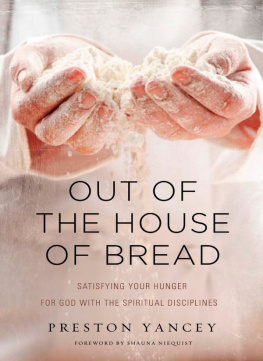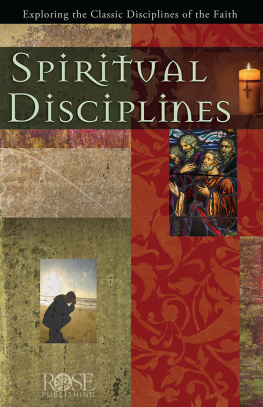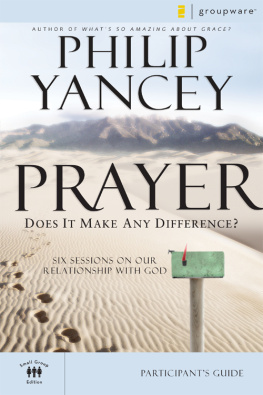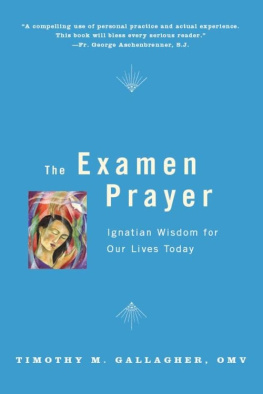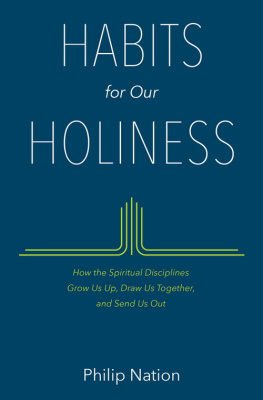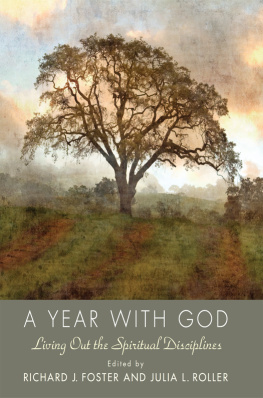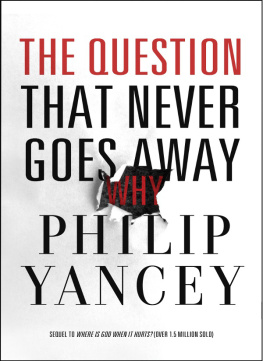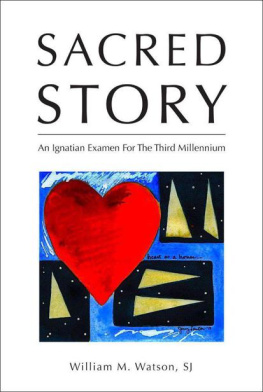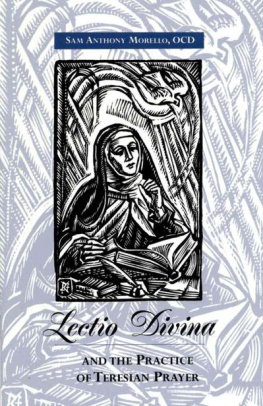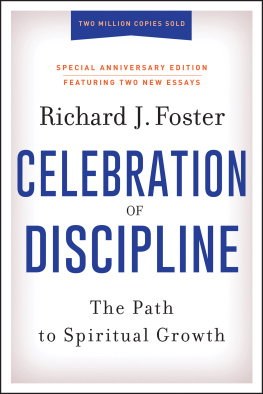Also by Preston Yancey
Tables in the Wilderness
ZONDERVAN
Out of the House of Bread
Copyright 2016 by Preston Yancey
ePub Edition November 2015: ISBN 978-0-310-33889-5
Requests for information should be addressed to:
Zondervan, 3900 Sparks Dr. SE, Grand Rapids, Michigan 49546
Library of Congress Cataloging-in-Publication Data
Yancey, Preston, 1989
Out of the house of bread : satisfying your hunger for God with the spiritual disciplines / Preston Yancey.
pages cm
Includes bibliographical references.
ISBN 978-0-310-33886-4 (hardcover) ISBN 978-0-310-33889-5 (ebook) 1. God (Christianity) Worship and love. 2. Spiritual formation. 3. Bread Religious aspects Christianity. 4. Baking Miscellanea. I. Title.
BV4817.Y36 2015
248.4'6 dc23
2015023992
All Scripture quotations, unless otherwise indicated, are taken from The Holy Bible, New International Version, NIV. Copyright 1973, 1978, 1984, 2011 by Biblica, Inc. Used by permission. All rights reserved worldwide.
Any Internet addresses (websites, blogs, etc.) and telephone numbers in this book are offered as a resource. They are not intended in any way to be or imply an endorsement by Zondervan, nor does Zondervan vouch for the content of these sites and numbers for the life of this book.
All rights reserved. No part of this publication may be reproduced, stored in a retrieval system, or transmitted in any form or by any means electronic, mechanical, photocopy, recording, or any other except for brief quotations in printed reviews, without the prior permission of the publisher.
Cover design: James W. Hall IV
Cover photography: DNY59 / Getty Images
Interior design: Denise Froehlich
Edited by John Sloan, Bob Hudson, and Becky Jen
First printing November 2015
For Dr. David Lyle Jeffrey and the people of HopePointe Anglican Church, In Thy light we shall see light Psalm 36:9
Contents

by Shauna Niequist

A ll my favorite stories are, essentially, stories about God or stories about food, and the very best are stories about both. One of the great losses of modern life and certainly modern faith, it seems to me, is that in many ways weve divorced faith from real, actual life weve fixed faith firmly in the mind and the heart, respectable places, tidy spots. And then actual life hands and messes and smells and textures and dirt and bones those things are just the stuff of the world.
But the world was created, as it were, by divine breath. And it still gasps with divinity, at least to me. For those of us who are listening, the music of faith is being played by those hands and in that dirt and in flour and water, in rocks and trees, in the plain old stuff of life, not simply relegated to the idea realm, tucked away, abstract.
And so then, a book about liturgy and bread baking is totally my jam. Liturgy: the work of the people. The skeleton on which we can hang our words and songs about God. The container that lovingly gathers up our corporate language. And bread: the simplest, most iconic of all nourishment. Bread: the starting point. Bread: one half of the Eucharist feast.
When I first began baking bread, I felt as though Id all of a sudden gained the ability to perform magic. Id been an enthusiastic home cook for years but a terrible and uninspired baker. Im not math-y or precise enough for baking, so I always skip steps, and the results, unsurprisingly, are terrible. What I love about cooking is how live and active it feels, as if the fire and the flavors and I are all talking to each other, responding, adjusting. Baking feels or felt like arithmetic, the same every time, a touch boring.
And then I began baking bread, and it felt like a conversation. It felt active and a little different each time. I had to listen and watch, readjust, find warmer or cooler places to let it rise. I had to learn how much kneading was too much and how much too little. And I felt that rush of pleasure when the steam escaped from the first cut. I ate half the first loaf standing at the stove, burning my lips and my fingers, a spoon of cherry jam in one hand, the hot bread in the other.
Chicken, when you cook it, is still chicken. It was raw chicken, and then it becomes cooked chicken. Onions: raw, then cooked. But its another thing altogether when flour and water and salt and yeast become bread. The closest to magic Ive come, I think. And it gets me every time. I take pride in things I make guacamole or berry crisp or green-chili strata, but the pride I feel about bread baking is something else entirely.
Maybe that pride comes from the transformation, or maybe it comes from the trickiness. Ive ruined a lot of things in the kitchen but none so often as bread it feels as though it has a mind of its own and youre just paying attention. The payoff for the attention is good bread, and its worth it every time.
And so, of course, with the disciplines of spiritual life: the greatest meaning comes in the trying, the learning, the listening and adjusting. I dont feel I deserve any great reward for those disciplines that come easily to me: truth-telling, connection, hospitality. But the ones that require more from me Sabbath, silence, solitude? Im delighted with myself when I manage them, and delighted even more with what they yield in me. As with anything in the kitchen, in the realm of spirituality the more one has to struggle for it, the more valuable, the more transformational.
And so a beautiful loaf of bread is a triumph. For me, so is a Sabbath or hard-fought minutes spent in centering prayer, the mind darting less and less often as I practice. With each minute I am able to add to my practice of silence, I feel proud, the same way I did when my first beautiful loaf came from the oven, crackling and steaming.
This is worthwhile work: the spiritual and the culinary both. Partially because work is worthwhile. Our world doesnt reflect that back to us very often these days, but we used to know this, that the best relationships are the ones weve fought for, the deepest truths the ones weve struggled for, the sweetest moments of rest the ones we earned following hard work.
You can buy bread, and you can live a shallow spirituality. Those are easy things to do. Those are the convenient things to do. But the work is an invitation to be transformed, which is what I believe we all really want more than happiness or comfort.
We want to be transformed, and this beautiful book is one invitation after another to that transformation, through work, through grace, through baking bread and silence and prayer and Gods Word. My life has been altered as Ive turned the pages, and I believe that kind and intelligent invitation beckons across the pages to you as well.
SHAUNA NIEQUIST,
JUNE 2015

You shall eat in plenty and be satisfied, and praise the Name of the Lord your God, who has dealt wondrously with you.
The eyes of all wait upon you, O Lord: And you give them their food in due season.
O Lord our God, you supply every need of ours according to your great riches: Bless the hands that work in this place, and give us grateful hearts for daily bread; through Jesus Christ our Lord. Amen.
The blessing of a kitchen from the Order of a Celebration of a Home of
Next page
